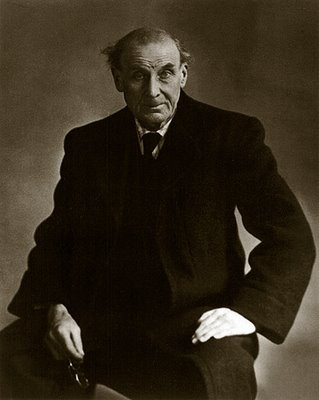
I have written several times about Eugène Atget and his photographs of Paris over the years. There is a new exhibit,
Atget: Une Rétrospective, at the old Richelieu site of the Bibliothèque Nationale de France (through July 1). This first retrospective of Atget's photographs in France commemorates the 150th anniversary of Atget’s birth and the 80th anniversary of his death. I read a review by Angel Gurría-Quintana (
Portraits of a lost metropolis, April 16) in the
Financial Times:
“I can say that I now possess all of Old Paris.” This extraordinary claim, made in 1920 by the French photographer Eugène Atget (1857-1927), was not as outlandish as it sounds. Writing in a letter to the director of the Institut des Beaux-Arts, Atget was referring to the completion of a lifetime’s project: capturing the city’s streets, monuments and views in their endless variety. When he died seven years later, the photographic pioneer left behind more than 25,000 images and 8,500 glass negatives, divided among government institutions and private collectors. This cache of images remains the largest ever produced to document the French capital. [...]
Surprisingly for someone who thought of himself as a workaday collector of views, Atget was even appropriated by the surrealists. His next-door neighbour, the American avant-garde photographer Man Ray, published a handful of his pictures in André Breton’s magazine La Révolution Surréaliste. Rather than its last romantic, Atget was photography’s first modern. Man Ray’s assistant, the American photographer Berenice Abbott, became the greatest champion of Atget’s work. It is to her that we owe the only known photographic portrait of Atget [shown here], taken months before his death, and also on display at the Bibliothèque Nationale. In it he is gaunt and hunched over, almost haunted, as if staring into a lost past that lingered only in his luminous images.
To muse on the Paris of yesteryear, here are some online Atget collections, from the
George Eastman House and
iPhotoCentral. Also of interest is Christopher Rauschenberg's
exhibit of companion photographs, made in the same locations as Atget's.
 I have written several times about Eugène Atget and his photographs of Paris over the years. There is a new exhibit, Atget: Une Rétrospective, at the old Richelieu site of the Bibliothèque Nationale de France (through July 1). This first retrospective of Atget's photographs in France commemorates the 150th anniversary of Atget’s birth and the 80th anniversary of his death. I read a review by Angel Gurría-Quintana (Portraits of a lost metropolis, April 16) in the Financial Times:
I have written several times about Eugène Atget and his photographs of Paris over the years. There is a new exhibit, Atget: Une Rétrospective, at the old Richelieu site of the Bibliothèque Nationale de France (through July 1). This first retrospective of Atget's photographs in France commemorates the 150th anniversary of Atget’s birth and the 80th anniversary of his death. I read a review by Angel Gurría-Quintana (Portraits of a lost metropolis, April 16) in the Financial Times:
No comments:
Post a Comment